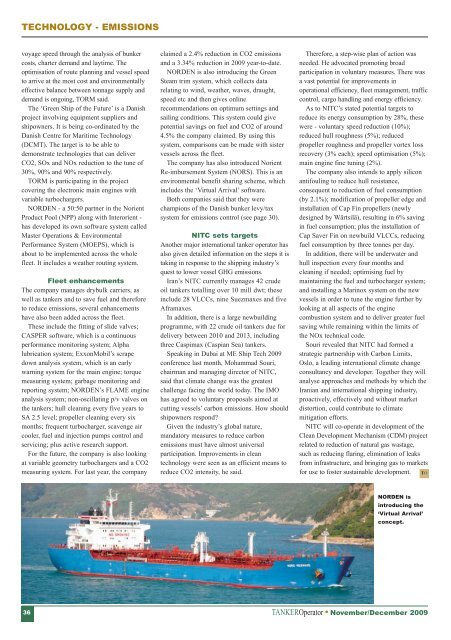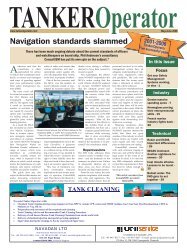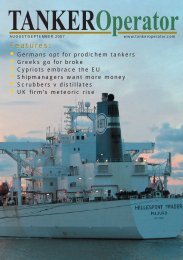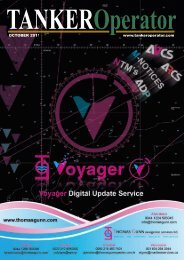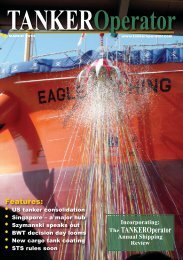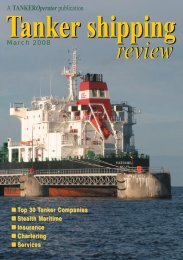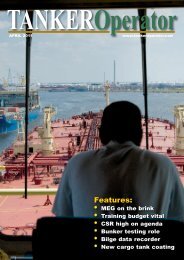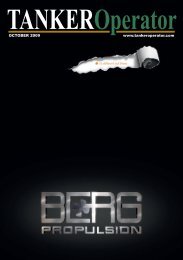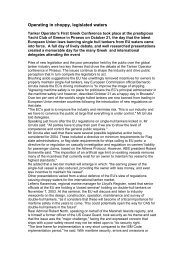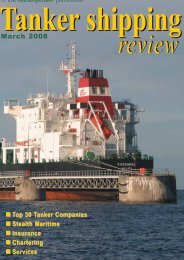Features: - Tanker Operator
Features: - Tanker Operator
Features: - Tanker Operator
Create successful ePaper yourself
Turn your PDF publications into a flip-book with our unique Google optimized e-Paper software.
TECHNOLOGY - EMISSIONS<br />
voyage speed through the analysis of bunker<br />
costs, charter demand and laytime. The<br />
optimisation of route planning and vessel speed<br />
to arrive at the most cost and environmentally<br />
effective balance between tonnage supply and<br />
demand is ongoing, TORM said.<br />
The ‘Green Ship of the Future’ is a Danish<br />
project involving equipment suppliers and<br />
shipowners. It is being co-ordinated by the<br />
Danish Centre for Maritime Technology<br />
(DCMT). The target is to be able to<br />
demonstrate technologies that can deliver<br />
CO2, SOx and NOx reduction to the tune of<br />
30%, 90% and 90% respectively.<br />
TORM is participating in the project<br />
covering the electronic main engines with<br />
variable turbochargers.<br />
NORDEN - a 50:50 partner in the Norient<br />
Product Pool (NPP) along with Interorient -<br />
has developed its own software system called<br />
Master Operations & Environmental<br />
Performance System (MOEPS), which is<br />
about to be implemented across the whole<br />
fleet. It includes a weather routing system.<br />
Fleet enhancements<br />
The company manages drybulk carriers, as<br />
well as tankers and to save fuel and therefore<br />
to reduce emissions, several enhancements<br />
have also been added across the fleet.<br />
These include the fitting of slide valves;<br />
CASPER software, which is a continuous<br />
performance monitoring system; Alpha<br />
lubrication system; ExxonMobil’s scrape<br />
down analysis system, which is an early<br />
warning system for the main engine; torque<br />
measuring system; garbage monitoring and<br />
reporting system; NORDEN’s FLAME engine<br />
analysis system; non-oscillating p/v valves on<br />
the tankers; hull cleaning every five years to<br />
SA 2.5 level; propeller cleaning every six<br />
months; frequent turbocharger, scavenge air<br />
cooler, fuel and injection pumps control and<br />
servicing; plus active research support.<br />
For the future, the company is also looking<br />
at variable geometry turbochargers and a CO2<br />
measuring system. For last year, the company<br />
claimed a 2.4% reduction in CO2 emissions<br />
and a 3.34% reduction in 2009 year-to-date.<br />
NORDEN is also introducing the Green<br />
Steam trim system, which collects data<br />
relating to wind, weather, waves, draught,<br />
speed etc and then gives online<br />
recommendations on optimum settings and<br />
sailing conditions. This system could give<br />
potential savings on fuel and CO2 of around<br />
4.5% the company claimed. By using this<br />
system, comparisons can be made with sister<br />
vessels across the fleet.<br />
The company has also introduced Norient<br />
Re-imbursement System (NORS). This is an<br />
environmental benefit sharing scheme, which<br />
includes the ‘Virtual Arrival’ software.<br />
Both companies said that they were<br />
champions of the Danish bunker levy/tax<br />
system for emissions control (see page 30).<br />
NITC sets targets<br />
Another major international tanker operator has<br />
also given detailed information on the steps it is<br />
taking in response to the shipping industry’s<br />
quest to lower vessel GHG emissions.<br />
Iran’s NITC currently manages 42 crude<br />
oil tankers totalling over 10 mill dwt; these<br />
include 28 VLCCs, nine Suezmaxes and five<br />
Aframaxes.<br />
In addition, there is a large newbuilding<br />
programme, with 22 crude oil tankers due for<br />
delivery between 2010 and 2013, including<br />
three Caspimax (Caspian Sea) tankers.<br />
Speaking in Dubai at ME Ship Tech 2009<br />
conference last month, Mohammad Souri,<br />
chairman and managing director of NITC,<br />
said that climate change was the greatest<br />
challenge facing the world today. The IMO<br />
has agreed to voluntary proposals aimed at<br />
cutting vessels’ carbon emissions. How should<br />
shipowners respond?<br />
Given the industry’s global nature,<br />
mandatory measures to reduce carbon<br />
emissions must have almost universal<br />
participation. Improvements in clean<br />
technology were seen as an efficient means to<br />
reduce CO2 intensity, he said.<br />
Therefore, a step-wise plan of action was<br />
needed. He advocated promoting broad<br />
participation in voluntary measures. There was<br />
a vast potential for improvements in<br />
operational efficiency, fleet management, traffic<br />
control, cargo handling and energy efficiency.<br />
As to NITC’s stated potential targets to<br />
reduce its energy consumption by 28%, these<br />
were - voluntary speed reduction (10%);<br />
reduced hull roughness (5%); reduced<br />
propeller roughness and propeller vortex loss<br />
recovery (3% each); speed optimisation (5%);<br />
main engine fine tuning (2%).<br />
The company also intends to apply silicon<br />
antifouling to reduce hull resistance,<br />
consequent to reduction of fuel consumption<br />
(by 2.1%); modification of propeller edge and<br />
installation of Cap Fin propellers (newly<br />
designed by Wärtsilä), resulting in 6% saving<br />
in fuel consumption; plus the installation of<br />
Cap Saver Fin on newbuild VLCCs, reducing<br />
fuel consumption by three tonnes per day.<br />
In addition, there will be underwater and<br />
hull inspection every four months and<br />
cleaning if needed; optimising fuel by<br />
maintaining the fuel and turbocharger system;<br />
and installing a Marinox system on the new<br />
vessels in order to tune the engine further by<br />
looking at all aspects of the engine<br />
combustion system and to deliver greater fuel<br />
saving while remaining within the limits of<br />
the NOx technical code.<br />
Souri revealed that NITC had formed a<br />
strategic partnership with Carbon Limits,<br />
Oslo, a leading international climate change<br />
consultancy and developer. Together they will<br />
analyse approaches and methods by which the<br />
Iranian and international shipping industry,<br />
proactively, effectively and without market<br />
distortion, could contribute to climate<br />
mitigation efforts.<br />
NITC will co-operate in development of the<br />
Clean Development Mechanism (CDM) project<br />
related to reduction of natural gas wastage,<br />
such as reducing flaring, elimination of leaks<br />
from infrastructure, and bringing gas to markets<br />
for use to foster sustainable development. TO<br />
NORDEN is<br />
introducing the<br />
‘Virtual Arrival’<br />
concept.<br />
36<br />
TANKER<strong>Operator</strong> November/December 2009


